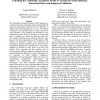Free Online Productivity Tools
i2Speak
i2Symbol
i2OCR
iTex2Img
iWeb2Print
iWeb2Shot
i2Type
iPdf2Split
iPdf2Merge
i2Bopomofo
i2Arabic
i2Style
i2Image
i2PDF
iLatex2Rtf
Sci2ools
127
click to vote
HICSS
1999
IEEE
1999
IEEE
Extending the Technology Acceptance Model to Account for Social Influence: Theoretical Bases and Empirical Validation
The Technology Acceptance Model (TAM) represents an important theoretical contribution toward understanding IS usage and IS acceptance behaviors [6, 19]. However, as noted by several IS researchers [cf: 4, 5, 6, 9, 14], TAM is incomplete in one important respect: it doesn't account for social influence in the adoption and utilization of new information systems. Davis [4] and Davis et al. [6] noted that it is important to account for subjective norm (SN), the construct denoting social influence. However, they observed that the conceptualization of SN based on TRA (Theory of Reasoned Action) has theoretical and psychometric problems. Specifically, they observed that it is difficult to distinguish if usage behavior is caused by the influence of referents on one's intent or by one's own attitude. They suggested that this problem may be circumvented by using an alternative theoretical basis for conceptualizing SN, specifically in terms of Kelman's [10, 11] processes of ...
Biometrics | HICSS 1999 | Important Theoretical Contribution | Social Influence | Understanding Is Usage |
| Added | 03 Aug 2010 |
| Updated | 03 Aug 2010 |
| Type | Conference |
| Year | 1999 |
| Where | HICSS |
| Authors | Yogesh Malhotra, Dennis F. Galletta |
Comments (0)

